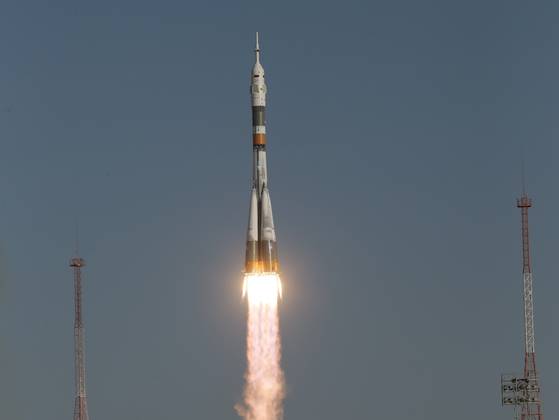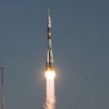
Farewell to Baikonur? Russia Confirms Intention to Move Away from Space Cooperation with Kazakhstan
Publication: Eurasia Daily Monitor Volume: 9 Issue: 194
By:

On the day preceding Nursultan Nazarbayev’s latest visit to Moscow (see EDM, October 19), the widely-read Russian daily newspaper Izvestia published an interview previously obtained from an unidentified high-level official of the Russian Space Agency (Roskosmos). In his conversation with journalists, the official claimed that Russia and Kazakhstan had failed to reach a final agreement on the construction of a new launch site on the premises of the Baikonur Cosmodrome located on Kazakhstan’s steppes, thus jeopardizing the future of bilateral cooperation on space-related matters (Izvestia, October 8).
In 2004, Presidents Nazarbayev and Vladimir Putin decided to jointly refurbish Baikonur’s launch capabilities by implementing a new large-scale space launch complex called Baiterek whose cost was estimated to be around $1.6 billion. While Russia was expecting its Central Asian partner to fully finance the project, explaining this stance by Kazakhstan’s territorial ownership of all Baikonur components, Astana progressively stalled technical negotiations. It later suggested dividing the financing in half, with Russia providing $800 million and the necessary expertise (Izvestia, October 8). However, the Kremlin balked at this idea, proposing instead to use Russia’s rental fees for Baikonur ($115 million annually) as additional sponsorship. According to Kazakh Space Agency representatives, Kazakhstan has no budgetary funds earmarked for Baiterek, as the project was initially defined in a special intergovernmental agreement with specific funding conditions (Zakon.kz, October 10).
Russia’s intention to build Baiterek was driven primarily by its desire to start developing a new type of carrier rocket named Angara whose testing was scheduled for 2012 but had to be postponed due to the lack of progress on the financing component. Angara’s main advantage with regard to its predecessor, the Proton rocket, which still remains the mostly widely-used launch vehicle in the Russian space industry, is the presumed environmental neutrality of its fuel parts (Vesti.ru, April 13, 2011). Conversely, the Proton’s fuel mix is highly toxic and has frequently led to legal controversy as to its impact on human health in cases of failed launches.
In September 2007, an unsuccessfully programmed Proton rocket landed in Kazakhstan’s Karaganda region, 40 kilometers southwest of Zhezkazgan, which was being visited by President Nazarbayev. At the moment of its emergency landing, the rocket contained almost 219 tons of heptyl, an extremely dangerous chemical compound that may easily explode in the presence of oxidizers and cause cancers in humans. It also left a 45-meter wide and 20-meter deep crater in the ground (RIA Novosti, October 9, 2007; October 16, 2008). Although Kazakhstan asked for indemnities of over $60 million, Russia subsequently agreed to pay only $2.4 million in compensation, also promising to treat free of charge all Kazakhstani nationals who had suffered from this incident and submitted an official complaint (RIA Novosti, October 16, 2008).
Another reason for the Proton’s replacement by Angara is the former’s frequently observed technical deficiencies. For instance, in December 2010, the Russian Space Agency lost communication with three of its satellites that had been designed to complete the worldwide coverage of the Earth by the Russian-built GLONASS satellite system. The Proton rocket launched from Baikonur failed to bring them up to near-earth orbit; the three devices later crashed into the Pacific. As it was subsequently ascertained, the upper-stage rocket had been filled with 1.5 tons of fuel in excess of its normal capacity, mostly due to design errors. In mid-August 2011, another Proton launch vehicle brought the state-of-the-art Express-AM4 satellite to an improper orbit, leading to a breakdown of communication with the control center (RIA Novosti, August 24, 2011).
While Kazakhstan has been insisting on Russia’s financial participation in the Baiterek project, Moscow continued to pay its rental fees for the whole of Baikonur. In 2011, it paid $115 million in rent and an additional $50 million worth of investment into diverse maintenance operations. According to 2011 estimates, this total payment amounted to almost 4.2 percent of Roskosmos’s annual budget sustained by Russian taxpayers’ contributions (Vzglyad, June 7). In September of the same year, several members of Kazakhstan’s Parliament suggested increasing the level of Russian payments, explaining their move by the fact that Russia had been carrying out a constantly growing number of launches per year ever since the Baikonur rental agreement was finalized back in 1994 (RBC Daily, September 19, 2011). At that moment, Russian authorities decided to create another cosmodrome, known as Vostochny (literally “Eastern”), whose construction started in early 2012 in the Russian Federation’s Far Eastern Amur region bordering China. It is expected that Vostochny would launch its first carrier rocket in 2015, whereas the first launch of a piloted spaceship could be implemented three years later.
Although Russia’s Baikonur rent agreement runs through 2050 (its extension was ratified in April 2010), Roskosmos already plans to carry out 90 percent of its space launches from the Plesetsk (in the European part of Russia) and Vostochny cosmodromes by 2030. The share of launches operated from Russian territory is currently only 25 percent. Concurrently, the share of Baikonur is set to diminish to 10 percent in 20 years’ time (Dni.ru, May 26). Moreover, due to legal problems with Kazakhstan, Russia has already scheduled the testing of Angara rockets at Plesetsk in 2013 and is now considering their full transfer to Vostochny by 2015. While Kazakhstan’s leadership vows to develop a flagship space industry based on Baikonur, with Nazarbayev suggesting this September the establishment of a Baikonur Innovation Fund (Tengrinews, September 19), Russia seems to be rapidly losing interest in space cooperation with its southern neighbor. In April 2011, Anatoly Perminov, the then chairman of Roskosmos, even suggested selling 30 percent of Russia’s stake in Baikonur to its current users, namely the United States, the European Union, Ukraine and Kazakhstan itself, but only after Vostochny becomes fully operational (Vesti.ru, April 13, 2011).




